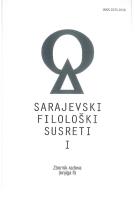PROSTORI SJEĆANJA : “AUSTROUGARSKA TEMA” I NJEZINO OBLIKOVANJE U ROMANU PONORNICA SKENDERA KULENOVIĆA
SPACES OF REMEMBRANCE : ‘AUSTRO-HUNGARIAN THEME’ AND ITS SHAPING IN SKENDER KULENOVIĆ’S NOVEL PONORNICA
Author(s): Sanjin KodrićSubject(s): Bosnian Literature
Published by: Bosansko filološko društvo
Keywords: recent Bosniak/Bosnian-Herzegovinian literature; cultural memory; representations of the past; historical trauma; memories; character of "new time" and "historical crossroads"; "Austro-Hungarian theme
Summary/Abstract: As in a large part a literature of ‘narrative of the past’, most often the national one, Bosniak literature from the late 19th and throughout the 20th century, just as the entire Bosnian-Herzegovinian literary practice from the same period, built and later continued and modified different more or less stabilized memorial-representational options – the so called memory figures ( figures of memory). The most noticeable among them is the figure of ‘new times’ and historical crossroads, within it particularly the ‘Austro-Hungarian theme’, which constitutes this figure as a whole in both chronological and essential sense. Caused by the crucial historical event of the end of the Ottoman rule in Bosnia, taking place more than 130 years ago (1878), the theme turned out to be a common, or even obsessive, literary topic of Bosniak literature from the 19th century onwards. Mostly realized as ‘an account of Austro-Hungarian occupation, in a range of images of disintegration of Muslim ethnic and social environment’ ‘to which the end of the Turkish Empire [...] is the end of what they were’, or more generally, as a literary representation of historical state of civilizational and existential vacuum between the two empires in the former Bosnia – the old, Ottoman Empire and the new, Austro-Hungarian Monarchy, in the moment when in reality ‘neither the former had been dead enough nor the latter alive enough’, the ‘Austro-Hungarian theme’ is a theme of a specific historical trauma, as well as a theme of a radical and comprehensive cultural transition or a theme of a complex and dramatic cultural transcoding, not only in terms of the subject of literary representation. In Bosniak, as well as in Bosnian-Herzegovinian literature, it appears at the same traumatic moment of a historical divide or crossroads which forms its basic framework and essence in the sense of its subject matter too, so historical trauma and states of cultural transition and transcoding, particularly in the case of Bosniak community, are also real circumstances of literary production and the entire literary-cultural communication process within which the theme is constituted. The ‘Austro-Hungarian theme’ is, therefore, undoubtedly both a dominant subject of literary representation and the most suitable expression of the entire existential, cultural, social and historical condition of the time, but its obsessive presence and particular circulation is not limited only to this relatively narrow literary historical period, but gets – due to the very complex and dynamic past of the socio-cultural context, as well mechanisms of literary history – passed down over the following decades, in the meanwhile being subjected to various changes too. It is not surprising, then, that in the scope of the ‘Austro-Hungarian theme’ – along with other literary pieces – there appears the first Bosniak novel, Zeleno busenje [‘The Green Sods’] (1898) by Edhem Mulabdić, after whom the theme will later be addressed, especially in Bosniak literature, by a whole range of different authors, including Skender Kulenović (1910–1978) in his novel Ponornica [‘The lost River’] (1977), which is one of the last Bosniak novels that in its whole capacity, although retroactively, deals with the trauma implied in the ‘Austro-Hungarian theme’, not only continuing its complex history, but also building a particularly important aspect of the ‘internal’ Bosniak as well as Bosnian-Herzegovinian literature as a composite and polycentric whole
Journal: Sarajevski filološki susreti: zbornik radova
- Issue Year: 1/2012
- Issue No: 2
- Page Range: 143-168
- Page Count: 26
- Language: Bosnian

